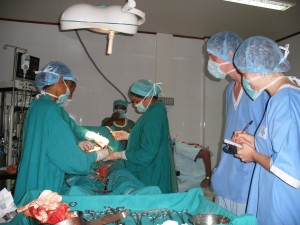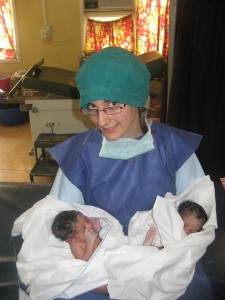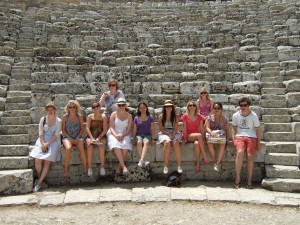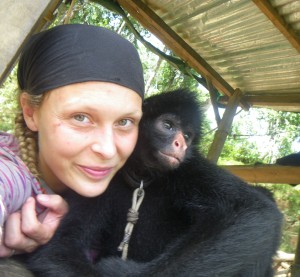INFORMATION AND ADVICE ON PLANNING A GAP YEAR

 Photo from Projects Abroad Photo from Global Volunteer Projects
Photo from Projects Abroad Photo from Global Volunteer Projects
What is a gap year?
A period of time, usually taken after post-16 studies or after graduation, when you are free from formal education. ‘Mini gaps’ (up to 3 or 4 months) are often taken during summer months.
What can you do in a gap year?
There are three main options:
(1) Go travelling overseas.
(2) Get career experience (‘internships’), UK or overseas.
(3) Go volunteering, UK or overseas.
A carefully planned gap year might be a combination of all three options.
A possible plan for a post-school overseas gap year:
(1) Fundraising, maybe until December (see our Fundraising Guide)
(2) A working project, 2 to 3 months minimum
(3) Independent travel
(4) For the final weeks, maybe pre-university paid work or children’s camp USA
Why include a working project?
(1) It is likely to improve your long-term employment prospects (see below).
(2) You will probably travel more purposefully, cheaply and safely after your project.

Photo from Global Volunteer Projects
What are the main options for a ‘working project’?
(1) Teaching and community work overseas
(2) Orphanages, childcare, children’s camps
(3) Conservation, community projects and expeditions
(4) Placements (paid/unpaid) in engineering, finance and business management
(5) Other career experience: medical, veterinary, law, journalism, tourism, etc
(6) Sports coaching, ski/snowboard courses, other outdoor pursuits
What do gap years cost?
Some gap years, mainly UK-based, can be self-financing.
Examples: The Year In Industry, Volunteering Matters.
For an overseas gap year, including flights, a project and independent travel, mostly in the range £2,000 to £5,000.
Travelling only: can be done fairly cheaply, but visiting several continents can be expensive.
How can you raise the money?
Refer to our fundraising guide.
What are the potential benefits of a well-spent gap year?
(1) Skills and experiences that universities and employers value. (In a competitive graduate employment market, a good academic record is no longer enough.)
(2) The opportunity to reassess higher education and career plans in the light of new experiences.
(3) You will contribute more to university life and get more out of it.
(4) You gain independence, confidence and a sense of achievement.
(5) You will have a lot of fun and make new friends around the world.


Photo from Oyster Worldwide Photo from Art History Abroad
How to find a reputable gap year organisation:
The gap year market includes long-established reputable organisations, many of them registered charities, and hundreds of others of variable quality and reliability. Do not rely solely on internet searches. Be wary of organisations that don’t have registered offices in the UK. Be wary of agencies that appear to run brilliant projects, but merely pass your details to others, taking a percentage of the fee. Use our database.
Before signing up to any project, ask for contact details for recently returned participants, contact them, and ask all the searching questions you can think of.
Questions you might ask:
Was there a selection process and pre-departure briefing?
Were they met on arrival?
What training was given?
What work did they do?
Did it benefit the community where you were working?
Was there in-country support?
Did they feel safe?
What accommodation was provided?
Did the experience come up to expectations?
Were there unexpected additional costs?
Was it value for money?
Was there a de-briefing afterwards?
VOLUNTEERING GAP YEARS: GOOD OR BAD?
There is a lot of criticism of gap years these days, particularly overseas volunteering:
-
- it may be a rip-off, lining the pockets of unscrupulous businesses;
-
- it trades on feelings of guilt among well-off and well-intentioned westerners;
-
- it may undermine local culture and enterprise by promoting western values and practices;
-
- it may have been imposed on a local community in return for financial benefits;
-
- it may take jobs from locals;
-
- it may have harmful environmental consequences.
Short-term volunteering at orphanages as part of a tourist package (‘Voluntourism’) has a particularly bad name. The so-called ‘orphans’ may have been rented out by their parents.
OUR RESPONSE
There is good and bad practice. The gap year ‘market’ consists of hundreds of providers, many of them of questionable repute and reliability, but also a core of well-established registered charities and small enterprises which we know and recommend. Go to our section on choosing your gap year organisation.
Look for a project that is a partnership between gap organisation and local community.
Do your research.
Ask lots of questions.
Contact previous volunteers.
Stay long enough to make a difference.
THE RESPONSE OF A RECENTLY RETURNED VOLUNTEER
Clare Deal has written one of our ‘case studies’. She has long been concerned about possible harmful effects from her project on the Pacific island of Vanuatu. She recently returned to the island to visit the school where she taught, and recounts her reflections.
There are Notes for parents and advice document for parents and sixth form advisers.
